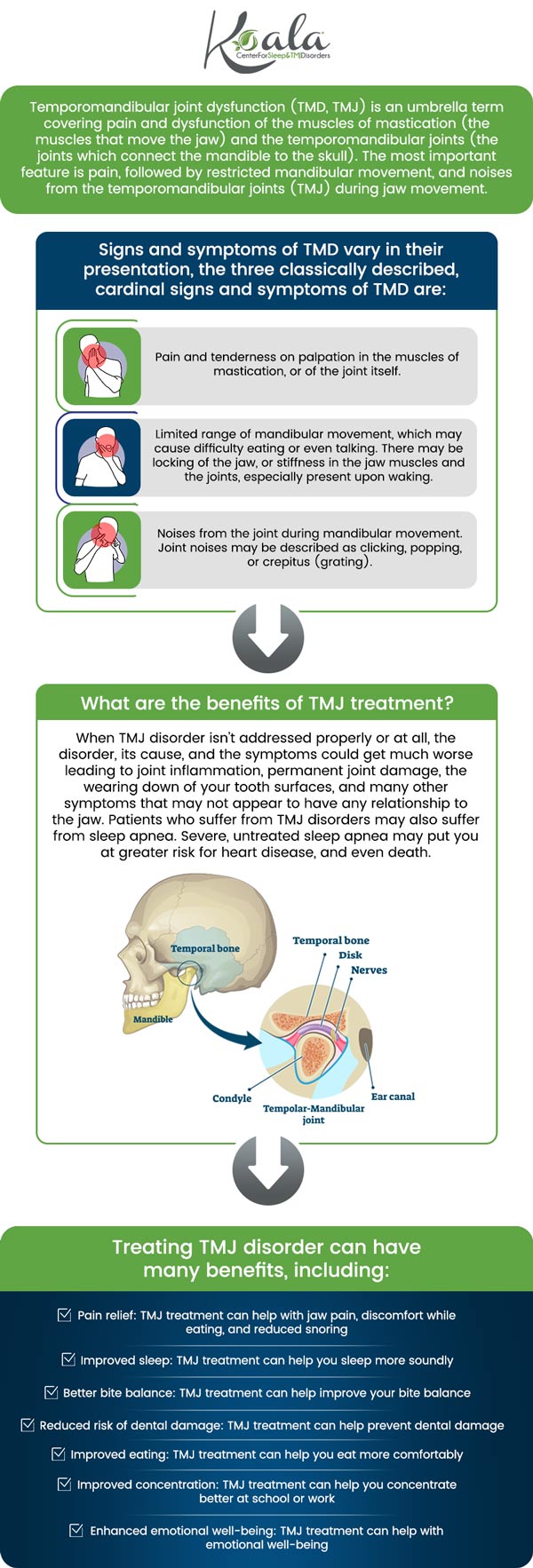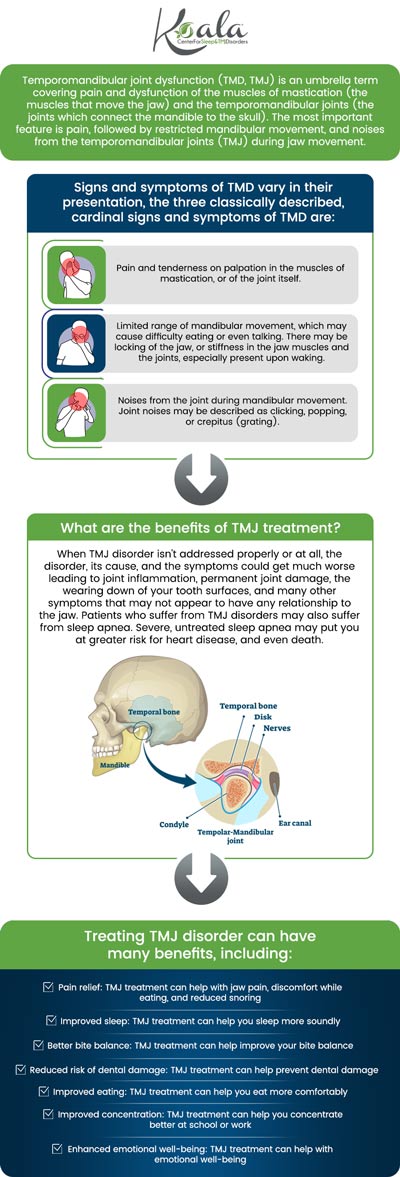TMJ Treatment Specialty Questions and Answer
If you are looking for a dentist who has dedicated himself to the diagnosis and treatment of TMJ, visit Koala® Center For Sleep & TMJ Disorders and talk to our professionals. We accept new patients. For more information call us today or request an appointment online. We serve patients from all over the USA. Locations in Bloomington IL, Peoria – Dunlap IL, El Paso TX and Wausau WI.




Table of Contents:
How do you know if you have TMJ?
How long does TMJ take to heal?
What can worsen TMJ?
What is the most common treatment for TMJ?
TMJ disorder, also known as temporomandibular joint disorder or simply TMD, is a condition that causes pain, among other symptoms, in the jaw. Its exact cause is unknown, but it is believed to be related to trauma or injury to the jaw joint and surrounding muscles, nerves, and ligaments. In most cases, the condition is caused by a problem with the joint, such as an injury or arthritis. It is also possible to develop a TMJ disorder without any known cause.
Also known as jaw joint disorder, TMJ is a condition that causes pain and stiffness in the jaw. It is usually caused by stress, poor posture, and teeth grinding at night. Most people do not realize they have TMJ until they experience symptoms such as a popping or clicking sound when they chew, difficulty chewing, and pain while chewing. Other signs of TMJ disorder include:
– Jaw pain on either side of face
– A popping or clicking sound (crepitus)
– Earaches or ear pain
– Headaches
– Stiff or sore jaw muscles
– Pain in the temple area
– Inability to open or close jaw (lockjaw)
– Pain in the neck, back, and shoulders
Each individual experiences different TMD symptoms with disparate causes, so the time it takes to heal is unique in every situation. However, the duration of the healing period for a TMJ disorder is highly dependent upon several factors, such as:
– The severity of the condition
– The chronicity of the condition (its duration)
– The cause of the TMJ disorder
– The overall health of the patient
– The presence of any underlying conditions
– Lifestyles, such as diet, sleep, and exercise
In mild or acute cases, symptoms typically resolve within a few days or weeks, and in moderate to severe cases, symptoms can last several months or even years. It is important to treat a TMJ disorder as soon as symptoms arise as the longer treatment is delayed, the more challenging the condition is to treat.
There are several things that can worsen an existing case of TMJ disorder, including:
– Using Teeth As Tools — Opening a package or bottle can cause or exacerbate TMJ disorder; even nail-biting can worsen the condition.
– Nervous Chewing — Gnawing on a pen, pencil, or other objects when bored, anxious, or stressed puts unnecessary strain on the TMJ, which can aggravate the condition.
– Taking Big Bites — Overextending the jaw joint, which occurs when taking big bites of food, can create an additional source of TMJ pain in the surrounding muscles and tendons.
– Poor Posture — Poor posture can put excess strain on the face and neck muscles, which can lead to more severe TMJ pain.
– Stomach Sleeping — The back, head, and neck must be in proper alignment when sleeping to avoid making TMJ symptoms worse.
– Teeth Grinding — One of the biggest causes of worsening TMJ pain is teeth grinding, which can be either a conscious or subconscious habit.
There are several common treatments for TMJ disorders, the most common include oral orthotics and TENS (transcutaneous electrical nerve stimulation). These treatments have proven to be highly effective in treating mild to moderate cases of TMJ disorder.
If you are experiencing the symptoms of a TMJ disorder, come to Koala® Center For Sleep & TMJ Disorders today. Our dental professionals dedicate their practice to treating. So you can find freedom from TMJ pain. Call us today to book an appointment with our dedicated TMJ treatment team.

Additional Services You May Need
▸ KoalaKIDZzz®
▸ Sleep Apnea
▸ Snoring
▸ TMJ Disorder
▸ Fatigue
▸ Sleep Disorders
▸ Weight Loss
▸ CPAP Alternative
▸ Oral Appliances




